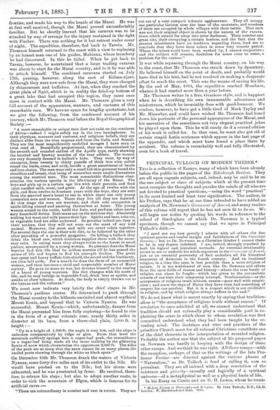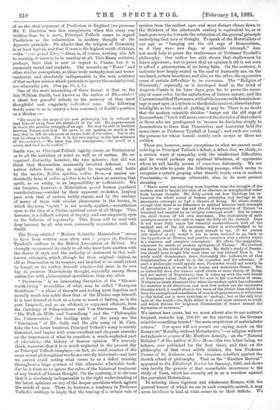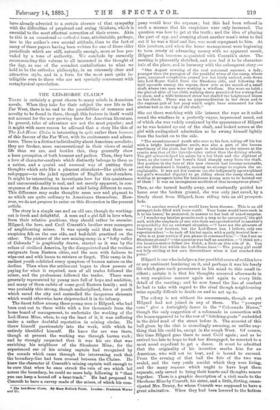PRINCIPAL TULLOCH ON MODERN THEISM.* Tuts is a collection of
Essays, many of which have been already before the public in the pages of the Edinburgh Review. They are all upon cognate subjects, and, indeed, may be said to be on the one subject or class of subjects which at the present time most occupies the thoughts and puzzles the minds of all who are not devoted to practical questions,—using the word "practical" in its most limited and least true signification. The author, ha his Preface, says that he at one time intended to have added an analysis of Dr. Newman's Grammar of Assent, and many readers of this volume will regret that he has not seen fit to do so. We will begin our notice by quoting his words in reference to the school of theologians of which Dr. Newman is a typical• specimen, though we cannot say that we agree in Principal Tulloch's drift :—
"I need not say how greatly I admire with all others the fine spiritual genius and tender insight and faithfulness of the Parochial Sermons ; but to Dr. Newman as a Christian thinker I cannot claim to be in any degree indebted. I am, indeed, strongly repulsed by both his logical and historical methods. An essential irrationality seems to me to underlie his whole argument in the Grammar of Assent, just as an essential perversity of fact underlies all his historical treatment of Arianism in the fourth century. Aud an irrational religion, in a time like ours, is less possible than a mere religion of nature. It is the withdrawal of men like Dr. Newman and others from the open fields of reason and history—where the true battle of religion can alone be fought—which has given to the naturalistic schools of our time their temporary triumph. Traditionalism—or the acceptance of religious truth without reason—goes well with empiricism ; and since the days of Hume they have even had something of respect for one another. But it is a respect which is not creditable to religion, and by which religion always suffers in tho end."
We do not know what is meant exactly by saying that traditionalism is "the acceptance of religious truth without reason." If revelation be once admitted at all, we cannot understand that tradition should not rationally play a considerable part in explaining the sense in which those to whom revelation was first committed understood what they had been taught by the revealing mind. The doctrines and rites and practices of the primitive Church must for all rational Christians constitute one of the chief elements in the interpretation of revealed religion. Probably the author saw that the subject of his proposed paper on Newman was hardly in keeping with the design of these other essays. And we think he was right. All those essays—with the exception, perhaps, of that on the writings of the late Pro fessor Ferrier—are directed against the various phases of "Naturalism," as Dr. Tulloch is fond of calling it, now so
prevalent. They are all imbued with a deep conviction of the existence and priority—causally and logically of a spiritual universe—of a metaphysical as well as a physical basis of life. In his Essay on Comte and on G. H. Lewes, whom he treats
of as the chief exponent of Positivism in England (we presume Mr. F. Harrison was less conspicuous when this essay was written than he is now), Principal Tulloch seems to regard Positivism as the culmination in modern thought of the Agnostic principle. He admits that the religion of Humanity is at least logical, and that if man is the highest result of things, —the "vrai grand Etre,"—there is, of course, nothing else left to worship, if there is to be worship at all. This Essay contains, perhaps, little that is new in regard to Comte, but it is eminently sound and readable. The remarks on " Force " and other similar conceptions, as ideas truly metaphysical and trans cendental, and absolutely indispensable to the very existence of that modern science which pretends to ignore the metaphysical, are admirably put. (See pp. 63, 4, 5.) One of the most interesting of these Essays is that on the
late William Smith, best known as the author of Thorndale
a short but graceful tribute to the memory of that most thoughtful and singularly individual man. The following words seem to us to convey a true summary of Smith's position as a thinker :—
" He stood on the steps of the new philosophy, but he refused to tear himself away from the threshold of the old. He impersonated in much the peculiar straggle of an age. He may be said to hesitate between Nature and God. He gave, in our opinion, so much to the one, that he left no adequate or secure hold of the other. Yet to the last he clung to both. For it is his own saying, in the last sentence of Gravenhurst,--‘ We have but two conceptions,—the world as a whole, and God as its author.' "
Smith was, as Principal Tulloch rightly states, an Evolutionist as to all the activities of mind as well as of matter. He re cognised distinctly, however, the two spheres ; but did not think that Materialism necessarily involved Atheism. Our author differs from this, as might be expected, and holds by the maxim, Nullus spiritus, uullus Deus,—a maxim un doubtedly true, if mains spiritus is to be taken as meaning that spirit, as an entity, is an impossibility or unthinkable. We can imagine, however, a Materialism quoad human psychical manifestations,—misled by their apparent evolution, keeping pace with that of certain bodily organs, and by the analogy of many of them with similar phenomena in the brutes, to which the term "spirit" is not usually applied,—nevertheless open to the idea of a Divine spiritual cause of all things. This, however, is a difficult subject of inquiry, and one singularly open to the fallacies of logomachy. This Essay will be read with deep interest by all who were personally acquainted with Mr. Smith.
The Essay entitled " Modern Scientific Materialism " seems to have been written soon after, and a propos of, Professor Tyndall's address to the British Association at Belfast. We strongly recommend its study to all who have been smitten with the charm of style and the audacity of statement in that wellknown utterance, which, though far from original—indeed, as old as Democritus in its essence, and inspired to no small extent by Lange, as its author himself admits—did more in its own day to promote Materialistic thought, especially among those unfamiliar with philosophical speculation, than any other.
" Pessimism " is an interesting discussion of the " life-notworth-living" absurdities of what may be called "European Buddhism "—a phase of thought and feeling more hopeless and morally much less noble than that of the Hindoo sage himself.
It is here treated of both as a form or mood of feeling, as in the poet Leopardi, and as an offshoot, or supposed offshoot, from the Ontology of Schopenbauer and Von Hartmann. Besides "Die Welt als Wille and Vorstellung " and the " Philosophie des Unbewussten," the leading texts of the essay are the " Pessimism " of Mr. Sully and the able essay of M. Caro. Like the two latter treatises, Principal Tulloch's essay is mainly historical, and begins with some excellent and eloquent remarks on the importance of what be considers a much-neglected part of education,—the history of human opinion. We scarcely think, however, that it is so much neglected in the present day as Principal Tulloch imagines—in fact, no small number of the more recent philosophical works are strictly historical—and here we cannot avoid noting what seems to us a defect running throughout a large portion of this otherwise admirable book. Far be it from us to ignore the value of the historical treatment of any branch of human thought. On the contrary, it is obvious that it is absolutely indispensable to the right understanding of the latest opinions on any of the deeper questions which agitate the minds of men. There is, however, a tendency in Professor Tulloch's writings to imply that the tracing of a certain vein of opinion from the earliest ages and most distant climes down to the thinkers of the nineteenth century is equivalent to, or at least goes very far towards the refutation of, the general principle underlying that vein of thought. To speak of the Materialists of our age as " hanging out the old rags of Democritism, as if they were new flags of scientific triumph," does not much help to prove the shallowness of Professor Tyndall's philosophy. Our author has ably shown that shallowness by direct argument ; but to prove that an opinion is old is not even to afford a presumption of its being false. On the contrary, it indicates how deeply-seated in the soul of humanity are, on the one hand, certain intuitions, and also, on the other, the oppressive sense of certain difficulties to be overcome. The "Religion of • Humanity," especially as it developed itself in the mind of Auguste Comte in his later days, goes far to prove the necessity of some callus for the satisfaction of human nature; and the Unconscious life of Hartmann,with all its innumerable foreshadow ings in past ages, is a tribute to the theistic instinct, absurd andunintelligible as his mode of putting it may be. There is no doubt that the modern scientific thinker "hangs out the old rags of Democritism ;" but it will never convert the disciples of that school, or those who are predisposed to become its disciples, simply to demonstrate to them that Democritus and Lucretius held the same views as Professor Tyndall or Lange ; and such are surely the persons for whose benefit mainly such essays as these are written.
There are, however, some exceptions to what we cannot avoid noticing as Principal Tulloch's defect, a defect due, we think, to a certain want of sympathy with the intellectual difficulties, and he would perhaps say spiritual blindness, of opponents whom he will hardly accuse of conscious dishonesty. We are glad to be able to quote the following passage, which seems to recognise a certain groping after theistic truth, even in modern Pessimism,—a passage admirable, also, in its more general meaning :
" There never was anything more hopeless than the struggle of the modern mind to banish the idea of an absolute or metaphysical order from human thought. Mr. Sully points out how Ontology has exhausted the whole round of human principles and feelings in its successive attempts to find a Source of Being. He shows clearly enough that there is no difference in method between such attempts of speculation in our day and the old interpretation of Nature as tenanted and inspired by an integral conscious mind.' But he misses the chief lesson of his own statement. The multiplicity of such attempts seems to him only to argue the folly of. the method. Doesit not more truly argue the essential reasonableness both of the method and of the old conclusion, which is acknowledged to be its highest result ? He is good enough to say, ' If we pursue this method at all, would it not be more rational to go back to the hypothesis of Theism, and provide ourselves with a reality which is a concrete and complete conception.' He offers 'the suggestion, whatever its worth, to modern apologists of Theism.' We overlook the sneer in the truth of the suggestion. Mr. Sully's study of Pessimism should have taught him more than he has learned from it. No study could demonstrate more thoroughly the hollowness of that Sensationalism of which he is the expositor and the advocate. If such a philosophy could satisfy man, Pessimism would not merely be bad metaphysics, it would be an insane and monstrous dream. But so incredibly dces the human mind cleave to some theory of Being, and not merely of Experience, that it takes up with the said dream of Pessimism rather than grovel for ever in the conclusion of sense. We have no doubt whatever that when the modern spirit has exhausted its searches in all directions, and seen how hollow are the successive theories which it would place in the room of the Divine Idea which has been the strength and consolation of man in all generations, it will return to this belief, not in mere cynicism as apology,' but as the only true light of the world,—the faith which is at once most rational in itself, and which throws the brightest illumination of reason around the mysteries of existence."
We cannot here quote, but we must advert also to our author's frequent remarks (pp. 218.19) on the craving in the German mind for something beyond " the mere empiricism of materialistic science." Our space will not permit our saying much on the Essays on"Morality without Metaphysics,"—or religion without metaphysic (a propos of Mr. Matthew Arnold),—on the " Natural Religion" of the author of Ecce Homo (the two latter being, we believe, now published for the first time), and that on the philosophy of that most subtle thinker, the late Professor Ferrier of St. Andrews, and his vivacious rebellion against the Scotch school of philosophy. That on the " Kantian Revival" appeared in the Edinburgh Review for January, 1883, and shows very lucidly the genesis of that remarkable recurrence to the study of Kant, which has recently set in as a reaction against the prevalent Materialism.
In noticing these vigorous and wholesome Essays, with the general tenour of which we are in such complete accord, it may seem invidious to hint at what seems to us their defects. We
have already adverted to a certain absence of that sympathy with the difficulties of perplexed and erring thinkers, which is essential to the most effectual correction of their errors. Akin to this is an occasional ex eathedrd tone, attributable, perhaps, less to the author's own mental attitude, than to the fact of many of these papers having been written for one of those older periodicals which are still, naturally enough, more or less pervaded by a tone of authority. We conclude by earnestly recommending this volume to all interested in the thought of the day, as one of the soundest contributions to what we hold to be the orthodox philosophy, in an extremely clear and attractive style, and in a form for the most part quite intelligible even to those who are not specially conversant with metaphysical speculation.




































 Previous page
Previous page